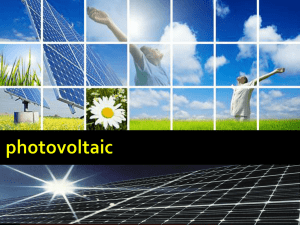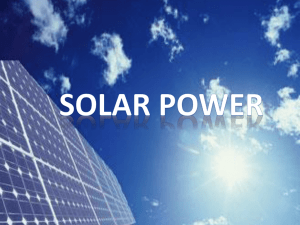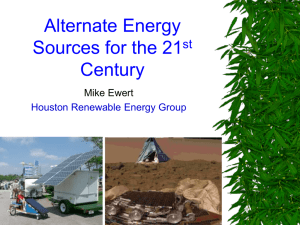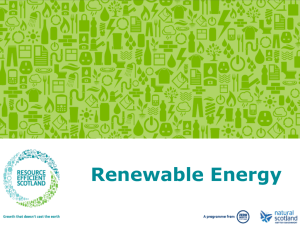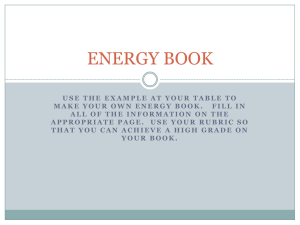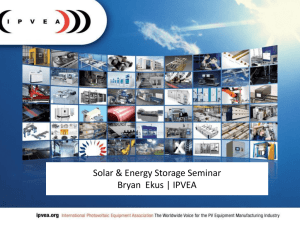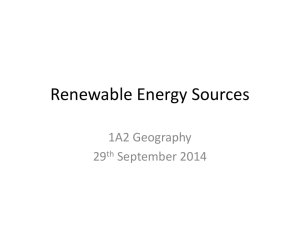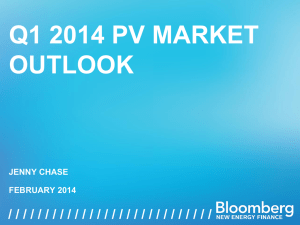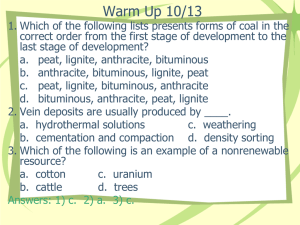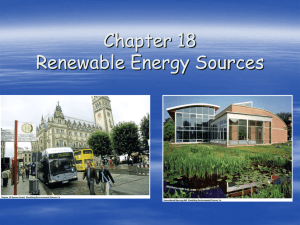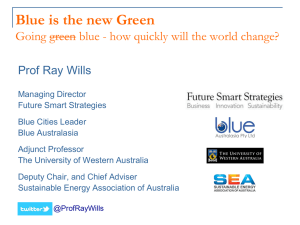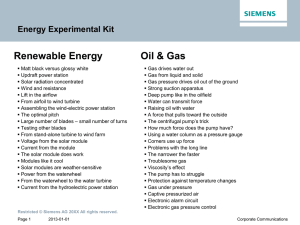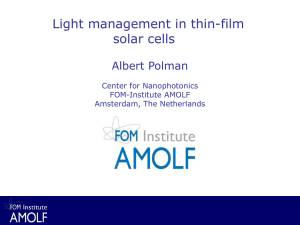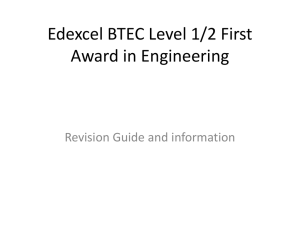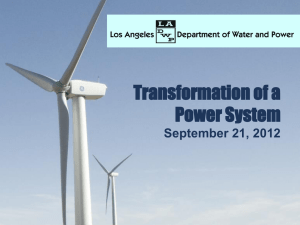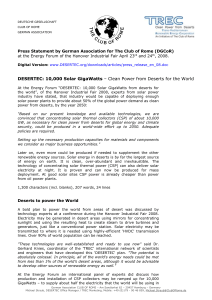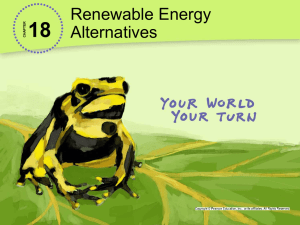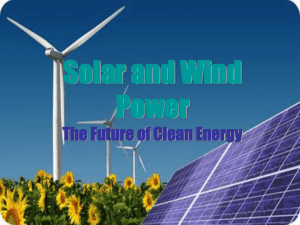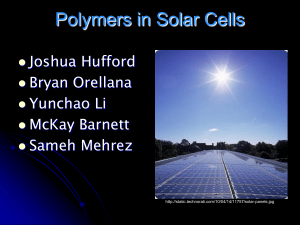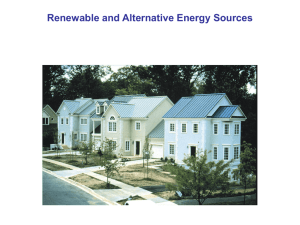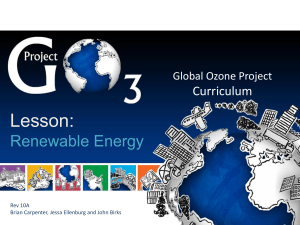Ways of producing energy
advertisement
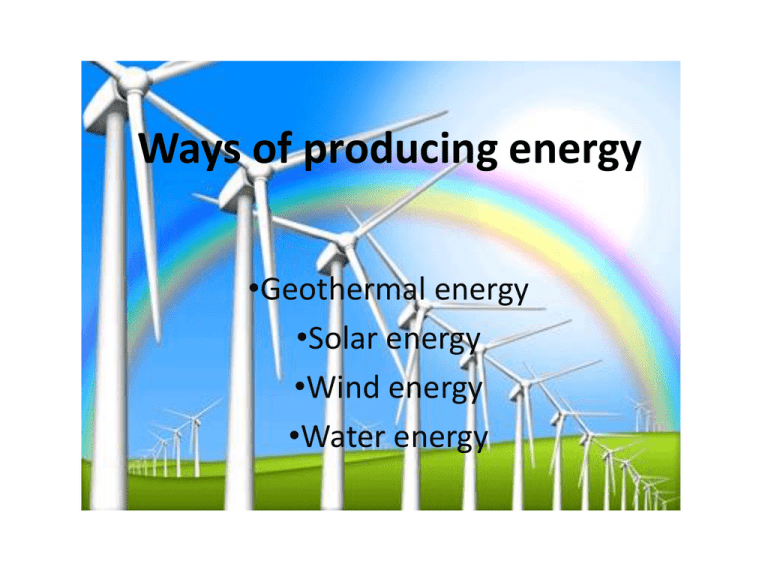
Ways of producing energy •Geothermal energy •Solar energy •Wind energy •Water energy Geothermal energy • Generated and stored in the earth • Originates from the original formation of the planet and from radioactive decay of minerals • The adjective geothermal originates from the Greek roots geo which means earth, and thermos, meaning heat. How does it work ? • Pipes are filled with water. • Cold water is send through the pipes. • The water is collected in a boiler. • Are able to work in many different ways. Advantages Disadvantages • No fuel is used to generate the power. • Many countries are pushing companies to adopt these clean sources of energy. • Has created many jobs for the local people. • Can run out of steam over a period of time. • It is only suitable for regions where temperature below the earth is quite high and can produce steam over a long period of time. Wind energy • The conversion of wind energy into a useful form of energy using wind turbines to make electricity. • The total amount of economically extractable power available from the wind is considerably more than present human power use from all sources. How does it work ? • Wind energy is a form of solar energy. • Winds are caused by the uneven heating of the atmosphere by the sun. • Wind speeds of over 160 km/h occur. • The wind energy is converted through friction into diffuse heat throughout the earth's surface and the atmosphere. Advantages Disadvantages • Plentiful, renewable, widely distributed and clean. • Wind is free and with modern technology it can be captured efficiently. • The land below can still be used. • The strength of the wind is not constant. • Wind turbines are noisy • When wind turbines are being manufactured some pollution is produced. Solar energy • Solar energy has been harnessed by humans since ancient times. • Solar powered electrical generation relies on heat engines and photovoltaics. • Solar energy's uses are limited only by human ingenuity. How does it work? • Rays of sunlight hit the solar panel and are absorbed by materials such as silicone. • Striking a solar cell by which electricity is immediately generated. • Is absorbed by the dark surface warms water in solar thermal collectors. • Amazingly a solar sail on a spacecraft can move it through the direct force of sunlight. Advantages • Saves money • No pollution by producing the electricity • Low or no maintenance • Can operate entirely independently • Supports local job and wealth creation • Sun is an unfailing source Disadvantages • High asset cost ( 4000 € ) • Producing solar panels isn‘t eco- friendly • Need a lot of space • Need a certain amount of sunlight to work Water Energy Hydroelectricity is the term referring to electricity generated by hydropower; the production of electrical power through the use of the gravitational force of falling or flowing water. It is the most widely used form of renewable energy. Generating methods: • Conventional (dams) • Pumped-storage • Run-of-the-river • Tide • Underground How does it work ? • The production of power using running water. • A dam must be built, which is usually located in a valley near a natural lake. • Water is channeled into the dam via tunnels and the water turns turbines which in turn powers generators. • It is possible to be produced very cheaply. Advantages Disadvantages • If electricity is not needed, the sluice gates can be shut. • The lake behind the dam can be used for watersports. • No pollution. • Dams are extremly expensive. • They must operate for many decades to become profitable. • People must move out. How to store energy ? • Energy storage is accomplished by devices or physical media that store some form of energy to perform some useful operation at a later time. • A wind-up clock stores potential energy. • A battery stores readily chemical energy. • And a hydroelectric dam stores energy in a reservoir as gravitational potential energy. Desertec • They are making use of solar energy and wind energy. • This concept will be implemented in North Africa and the Middle East. • Concept aims at promoting the generation of electricity in Northern Africa, the Middle East and Europa using solar power plants, wind parks and the transmission of this electricity to the consumption centres. • Is a non - profit Foundation. The deserts receive more energy from the sun in 6 hours, than the people can use or need in one year. Sources: - de.toonpool.com/.../wind%20power%20station_15939 - http://www.renewablepowernews.com/archives/2270 -www.makeenergynow.com/home-wind-power-systems/ -www.openmint.net/.../2011/04/eolica-energia.jpg - http://en.wikipedia.org/wiki/File:NesjavellirPowerPlant_edit2.jpg - http://www.earthlyissues.com/images/geother.JPG - http://renewables-energy.net/2011/07/24/solar-energy-plants/ - www.pvsolarchina.com/how-do-solar-panel-work.html - dogstayout.wordpress.com/.../14/the-good-water/ - www.rivernetwork.org/rn/taxonomy/term/24 - http://1.bp.blogspot.com/_bS1CTa2BiEM/SLKCEfw_CYI/AAAAAAAAAQA/1qB1EVfiPF0/s320/2.jpg - www.spiegel.de/wirtschaft/0,1518,635811,00.html - www.desertec.org/.../DESERTEC_whiteCSP.gif - http://www.tobiasbuckell.com/2011/06/11/solar-power-trends/ -

